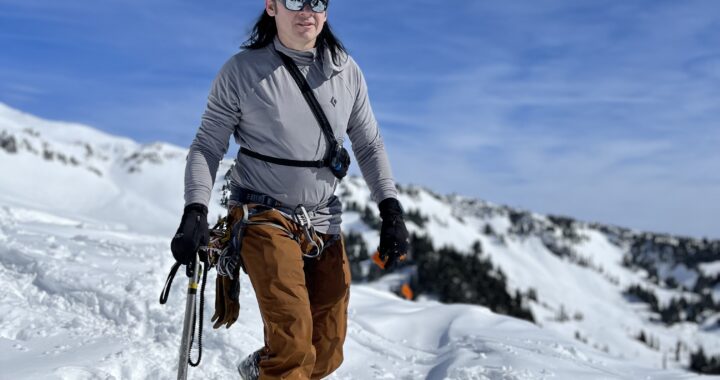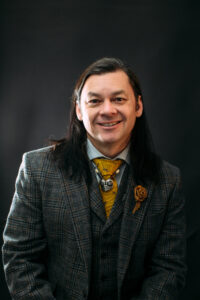When I am on a mission with my team on Mt. Rainier, I often think of all those who have come before us. How many people stood where I was at that moment? I think of my journey to this place and how different it would have been if I was not Native American. I have been fortunate to have many different mentors and friends within the outdoor community who encourage and support my journey, but many other Native Americans are not so lucky. So at those moments as we traverse the wind-blown slopes of the Cowlitz or Nisqually glaciers (named after local Native American tribes), I ask myself: how can we, as Mountain Rescue and Outdoor leaders, make that impact on advocating for Native Americans in the outdoors?
Outdoor leadership is not just an art; it is also a science. Theories and models provide a framework for understanding and practicing effective outdoor leadership. Three primary theories of leadership that impact Mountain Rescue Leaders are experiential learning, transformational leadership, and situational leadership. These concepts illuminate the dynamics between leaders, participants, and the natural environment. The leadership models impact the immediate decision-making of MRA leaders and the opportunities they provide others in the outdoors.
James MacGregor Burns introduced the transformational leadership theory, which states that transformational leaders inspire and motivate others to achieve higher performance and personal growth. In outdoor leadership, transformational leaders create a shared vision, foster positive relationships, and encourage participants to reach their full potential. Other models, such as Hersey and Blanchard’s situational leadership model, emphasize adapting leadership styles to the needs and capabilities of individuals or groups. These models recognize that effective leadership requires flexibility and a nuanced understanding of the dynamics in outdoor settings.
Experiential learning, pioneered by educational theorist David Kolb, occurs through a continuous cycle of concrete experience, reflective observation, abstract conceptualization, and active experimentation. Experiential learning provides a foundation for outdoor leadership, emphasizing the importance of reflection, processing, and applying new knowledge gained from outdoor experiences. This theory is a valuable framework for outdoor leaders to facilitate meaningful learning experiences in natural settings. By engaging participants in hands-on activities and challenging outdoor adventures, leaders create opportunities for individuals to encounter real-world situations and learn from their direct interactions with the environment.
Cultural competency is an essential aspect of Mountain Rescue Leaders’ advocacy. Rescue teams often operate in areas with cultural significance to Native American communities, such as sacred mountains, rivers, or valleys.
Through training programs that include Native American history and cultural protocols, they can prevent unintentional harm or disrespect during search and rescue missions. In addition to cultural competency education, these leaders can advocate for recruiting Native American individuals as rescue team members and outdoor guides. Representation matters, and having Native Americans in leadership roles within outdoor industries inspires others and ensures that decision making reflects the needs and values of their communities.
Reclaiming Connection to the Land
The outdoors has long been a source of solace, adventure, and cultural connection for countless people, but not all communities have equitable access to these spaces. Among those underrepresented in outdoor recreation are Native Americans, whose deep ancestral ties to the land often stand in stark contrast to the systemic barriers they face today. Recognizing this disparity, Mountain Rescue Leaders are stepping up as advocates, promoting inclusion, equity, and cultural preservation for Native Americans in outdoor settings through their leadership positions.
In Tacoma Mountain Rescue, our Board of Directors works collaboratively with the Puyallup Nation in order to gain funding for differing programs- from vehicle improvements to our latest drone program. In addition, some of our members speak at different workshops and conferences about Native Americans and outdoor leadership opportunities and some are published in local and national magazines describing different ways in which we, as a community, can support our local tribes.
Economic inequality, geographic isolation, and historical trauma often limit Native Americans’ participation in outdoor activities. Many reservations lack proximity to national parks, forests, or well-maintained trails, while the cost of equipment, permits, and travel poses additional hurdles. Moreover, systemic racism and stereotyping can create unwelcoming or even hostile environments for Native American individuals seeking outdoor experiences.
For Native Americans, the relationship with the land is profoundly spiritual and intertwined with their cultural identity. Historically, the land was not just a resource but a living entity, integral to ceremonies, stories, and community practices. However, colonial displacement, loss of tribal lands, treaty management, and exclusion from public spaces have disrupted these relationships. A Mountain Rescue Leader understands the importance of reconnecting Native American communities with their ancestral lands. These leaders integrate traditional ecological knowledge into their practices to bridge the gap between outdoor recreation and cultural preservation. They work alongside tribal leaders to ensure that Native American voices are central in conversations about land use, conservation, and public access. In doing so, they help Native American communities reclaim their presence in outdoor spaces.
Mountain Rescue Leaders can advocate for targeted policies to address these issues, such as reducing entrance fees for Native American people, providing outdoor education programs on reservations, and creating safe spaces where Native Americans feel respected and valued. Partnering with outdoor brands, nonprofits, and government agencies, they can champion initiatives like scholarship programs for Native American youth interested in outdoor leadership and job opportunities in conservation fields.
The Path Forward
Youth engagement and outdoor education in the outdoor community are a cornerstone of the Mountain Rescue Leaders’ advocacy efforts. By fostering partnerships with Native American tribes, schools, and organizations, they inspire the next generation to explore and protect the outdoors. Programs that teach outdoor skills, environmental stewardship, and outdoor leadership build confidence and reconnect Native American youth with their cultural heritage. These initiatives also counteract the narrative that outdoor spaces are primarily for white, affluent individuals. Instead, they reaffirm that Native Americans have always been stewards of these lands and continue to play a vital role in their preservation.
The advocacy of Mountain Rescue Leaders is part of a more significant movement to create a more inclusive outdoor culture. By addressing barriers to access, promoting cultural understanding, and amplifying Native American voices, they help ensure that the outdoors is a place of healing, adventure, and connection for everyone. As this work continues, it is essential to recognize that true inclusion requires systemic change and sustained effort. Mountain Rescue Leaders show that by combining cultural respect with a commitment to equity, the outdoor community can honor its past while forging a more inclusive future for Native Americans and all who cherish the natural world. Ultimately, their advocacy is not just about recreation—it’s about justice, reconciliation, and ensuring that the outdoors remains a shared and sacred space for generations to come.
Dr. R. Dennis Eller is a Rescue Technician with Tacoma Mountain Rescue. He taught biology and chemistry and is now a high school principal. He lives in Steilacoom, Wash., with his wife and three daughters.
TEXTB




